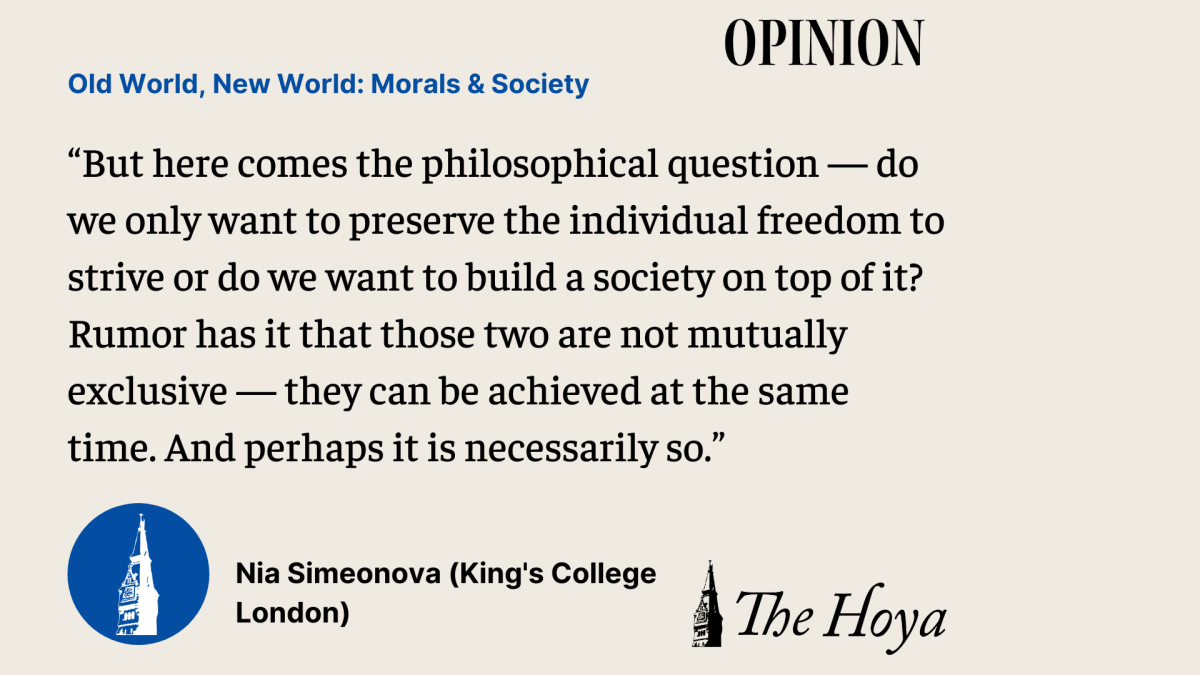As the plane began its descent over Washington, D.C., and its iconic monuments came into view, I thought: “This is it. The land of freedom.” I was reminded of that scene in the movie “The Parent Trap” when Annie boarded her flight at Heathrow Airport in London, nervously preparing herself to begin a new, American life. I felt a bit like her. I, similarly, had boarded a flight in London nine hours before. And I, too, was nervous.
Good thing culture shock is not shocking to me. I grew up in Sofia, Bulgaria, and moved to London for university when I was 19. British customs weren’t hard to grasp — I began saying sorry at least 60 times a day (even when people bumped into me), talked about the weather and started viewing kettles as something of a national treasure.
Now, having spent less than 20 days in the United States, I cannot make any definitive judgments — but I quite enjoy smiling at strangers on the street, making small talk with anyone and feeling the spirit of political debate all around. Europe surely has a better work-life balance, but the United States is busy reaching for the stars, Georgetown University students included. And although I can’t say anything with finality, for now, my verdict is as follows: Americans value freedom and success while Europeans value a sense of security and la dolce vita.
Before I left the United Kingdom, a professor of mine said: “You’ll see — professors there have to answer emails even on the weekend.” To my amazement, she was right. In most of Europe, the weekend is a sacred time when most people can forget about work. And in many countries, they are only getting longer. The Netherlands has one of the shortest average working weeks in the world — less than 32 hours. Even on weekdays, people still socialize with their friends and family after work. Think sipping wine along the canal and watching the moon rise. Or spending six hours around the dinner table, catching up and enjoying the food.
My impression of the United States so far is quite different. Dinner seems to be served no later than 6:30 p.m., and it is not uncommon for people to start their day at 5 a.m. German sociologist Max Weber detailed the influence of the Protestant ethic on Western capitalist vigor, the common thread being a deep regard for discipline, hard work and the accumulation of wealth. As far as I can tell, commitment to these principles tends to pay off. I do admire this diligent mindset and hope it rubs off on me in the coming months.
But perhaps hard work isn’t always enough. There are plenty of examples of people losing their jobs and homes and falling off track. Based on the values of individualism and success, the States fail to provide a safety net, unlike Europe. Almost all European countries have universal health care. Everyone pays a certain amount from their salary for the healthcare system, which in turn ensures that healthcare is accessible to everyone, regardless of their financial or social status. Of course, this system works better in some European countries than in others, but the principle of collective sacrifice for the greater good is important here.
Georgetown University philosophy professor Wilfried Ver Eecke has explored maternity leave policies. In my “Philosophy of Economics” class, he likes to remind us that in the United States, parents get only a tax exemption, no monetary support and only 12 weeks of maternity leave. In Bulgaria, you are entitled to 58 weeks for pregnancy and childbirth, paid at 90% of the actual salary. Bulgaria’s welfare system is far from perfect, don’t get me wrong. But it is a stark difference from the United States.
It is not a secret that social mobility is highest in the North of Europe — Denmark, Finland, Norway and Sweden being at the top. This means that it is far more likely for second and third generations to be better off than their parents. Based on that, American political philosopher and Harvard University professor Michael Sandel jokes in his book “The Tyranny of Merit” that the American dream of creating a better life for yourself seems to have migrated to Denmark.
Some people might argue that without as many social programs, individuals in the United States are encouraged to achieve more. Many people believe that hard work should be properly and proportionally awarded. They might be right. Maybe equal opportunity is the ultimate goal and any government interference beyond that impedes successful individuals. But here comes the philosophical question — do we only want to preserve the individual freedom to strive or do we want to build a society on top of it?
Rumor has it that those two are not mutually exclusive — they can be achieved at the same time. And perhaps it is necessarily so.
Then again, I still have four months left in the United States. With midterms approaching, it seems like there will be more waking up at 5 a.m. than any other leisurely activity. Studying at the densely-populated Lau until the early hours only adds to my dilemma. So, I count on you, industrious Georgetown students, to enrich my European perspective with your reflections on the topic.
Nia Simeonova is a student at King’s College London who’s studying on exchange at Georgetown this semester. This is the first installment of her column “Old World, New World.”





















Wilfried Ver Eecke • Feb 20, 2024 at 1:28 pm
Very insightful. Indeed supporting mothers for giving birth to a child by means of a tax deduction is excluding the poorest families. Is this not supporting the accusations by Marx that the capitalist society represses the poor?